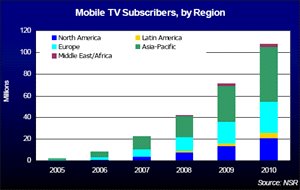Northern Sky Research Mobile TV 2006 Report
Since I don't have $1,495 to throw at this I will just have to settle for the press release.
From the release:
"Mobile TV today can best be described as nascent or nonexistent in most markets. The market is dominated by a variety of clips-based content streamed via unicast over 2-3G networks. Content is often choppy, battery life is lacking, and download times over existing networks are often quite long. This issue is expected to only worsen as more users request unicast video streams, thus further slowing down the network and user experience. It is no surprise therefore that many early stage mobile TV services have been met with low subscriber totals and include limited content."

"With mobile TV projected to generate significant subscribers and revenue over the next 5-10 years, mobile providers are examining new ways to distribute content without clogging their precious 3G network resources or infringing on the true killer application: mobile telephony. One rapidly emerging approach to mobile TV is to broadcast video content directly to users via satellite and/or terrestrial means, thus bypassing the 3G network and enabling mobile users to receive direct broadcasts from TV stations and content owners. This merging of unicast and broadcast is receiving quite a bit of attention, as virtually every mobile carrier is testing some form of new broadcast mobile TV technology. In fact at least 5 competing technologies for broadcast mobile TV are currently planned, with all backed by wireless heavyweights, such as Nokia, Qualcomm, Samsung and Crown Castle."
From the release:
"Mobile TV today can best be described as nascent or nonexistent in most markets. The market is dominated by a variety of clips-based content streamed via unicast over 2-3G networks. Content is often choppy, battery life is lacking, and download times over existing networks are often quite long. This issue is expected to only worsen as more users request unicast video streams, thus further slowing down the network and user experience. It is no surprise therefore that many early stage mobile TV services have been met with low subscriber totals and include limited content."

"With mobile TV projected to generate significant subscribers and revenue over the next 5-10 years, mobile providers are examining new ways to distribute content without clogging their precious 3G network resources or infringing on the true killer application: mobile telephony. One rapidly emerging approach to mobile TV is to broadcast video content directly to users via satellite and/or terrestrial means, thus bypassing the 3G network and enabling mobile users to receive direct broadcasts from TV stations and content owners. This merging of unicast and broadcast is receiving quite a bit of attention, as virtually every mobile carrier is testing some form of new broadcast mobile TV technology. In fact at least 5 competing technologies for broadcast mobile TV are currently planned, with all backed by wireless heavyweights, such as Nokia, Qualcomm, Samsung and Crown Castle."




0 Comments:
Post a Comment
<< Home